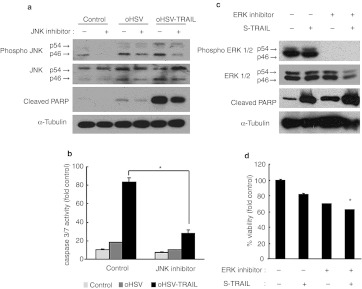Figure 4.
Oncolytic herpes simplex virus (oHSV)-tumor necrosis factor-related apoptosis-inducing ligand (TRAIL)-mediated apoptosis in resistant glioblastoma multiformes (GBMs) depends on c-Jun N-terminal kinase (JNK) activation and ERK inhibition. (a) Immunoblot analysis using antibodies against JNK, phosho-JNK, and cleaved poly-ADP ribose polymerase (PARP), on whole cell lysate prepared from LN229 cells treated with oHSV, oHSV-TRAIL (multiplicity of infection (MOI) = 1) or control in the absence (–) and presence (+) of JNK inhibitor (SP600125, 20 µmol/l) for 18 hours. (b) Caspase 3/7 activity of LN229 cells treated with oHSV, oHSV-TRAIL (MOI = 1), or control for 20 hours in the absence (–) and presence (+) of JNK inhibitor. *P < 0.05 in the comparison of oHSV-TRAIL treated cells in the absence and presence of JNK. (c) Immunoblot analysis using antibodies against ERK, phosho ERK, and cleaved PARP on whole cell lysate prepared from LN229 cells treated with S-TRAIL (100 ng/ml) in the absence (–) and presence (+) of ERK inhibitor (U0126, 20 µmol/l) for 18 hours. α-Tubulin was used as a loading control. (d) Cell viability assay showing the % viable LN229 cells after treatment with different combinations of U0126 (20 µmol/l) and TRAIL (100 ng/ml) for 48 hours. *P <0.05 JNK inhibitor group in the comparison with control (in b) and ERK inhibitor and S-TRAIL treatment group in the comparison with other treatment groups (in d). Error bars indicate SD.

